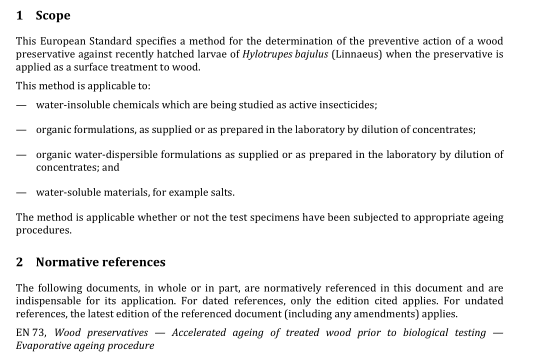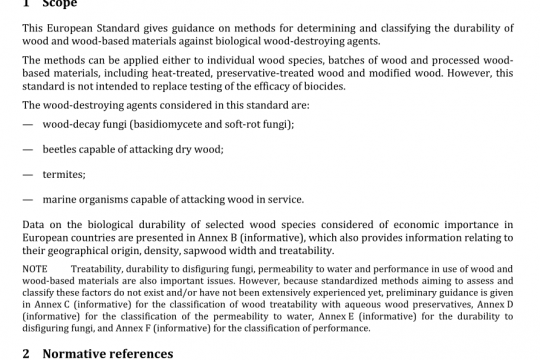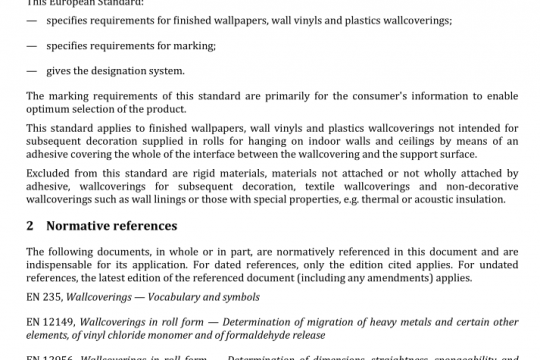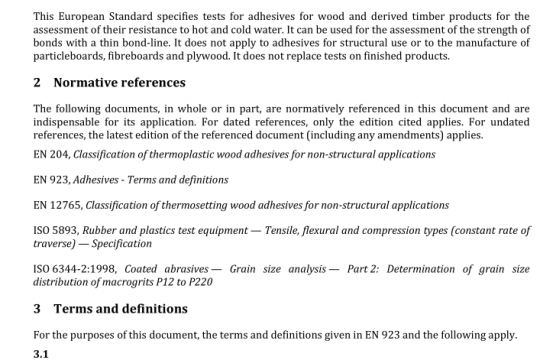BS EN ISO 3613 pdf free download
BS EN ISO 3613-2021 pdf free download.Metallic and other inorganic coatings一 Chromate conversion coatings on zinc, cadmium, aluminium-zinc alloys and zinc- aluminium alloys – Test methods.
For 0,10 ig/m1 Cr(VI): Measure 2,5 ml ofthis solution into a second 1 000 ml volumetric flask and make up to the mark. 1 ml ofthis standard solution contains 0,10 pg of Cr(VI).
For 013 pg/mI Cr(VI): Measure 3,3 ml ofthis solution into a third 1 000 ml volumetric flask and make up to the mark. 1 ml ofthis standard solution contains 0,13 tg of Cr(Vl).
For the preparation of the comparison solution for 010 .tg/cm2 Cr(VI), add 1 ml of orthophosphoric acid and 1 ml of diphenylcarbazide solution to 50 ml of the standard Cr(VI) solution solution with 0,10 tg/ml Cr(VI) and mix thoroughly. Then add 2 ml ofthe diphenylcarbazide solution and mix. Allow the solution to stand for 10 mm for the colour reaction to be completed.
For the preparation of the comparison solution for 013 tg/cm2 Cr(Vl), add 1 ml of orthophosphoric acid to 50 ml ofthe standard Cr(Vl) solution with 013 ig/ml Cr(VI) and mix thoroughly. Then add 2 ml ofthe diphenylcarbazide solution and mix. Allow the solution to stand for 10 mm for the colour reaction to be completed.
4.4 Test solution D (see 6.6 and 6.7 ).
Dissolve 050 g of diphenylcarbazide in 50 ml of acetone. Dilute slowly, while stirring, with 50 ml of water (rapid mixing can result in precipitation of diphenylcarbazide).
For maximum stability, store the solution under refrigeration in an amber-coloured glass bottle.
4.5 Sulfuric acid, diluted 1 + 3.
Slowly add one volume ofconcentrated sulfuric acid (p = 1,84 g/cm3) to three volumes of water.
4.6 Ammonium persulfate [(NH4)2S208J.
4.7 Sodium hydroxide (NaOH), 240 g/l solution.
4.8 Silver nitrate (AgNO3), 17 g/l solution.
4.9 Potassium dichromate (K2Cr2O7), standard solution.
Dilute 2 ml of standard volumetric potassium dichromate solution (4,9 g/l) to 1 000 ml.
4.10 Phosphate buffer solution.
Dissolve 55 g of sodium dihydrogen orthophosphate monohydrate (NaH2PO4H20) in 100 ml of water.
5 Apparatus
Use normal laboratory apparatus and the following.
Glassware shall be of grade A. Pipettes shall be calibrated.
Clean all glassware thoroughly. It is recommended that cleaning be done by boiling the glassware with nitric acid (HNO3) of 30 % mass fraction, and then rinsing thoroughly with distilled water or water of equivalent purity. Adequate cleanliness should be demonstrated through the analysis of method blanks.
5.1 Photoelectric absorptiometer (colorimeter), with a filter having a mean transmission of 520 nrn. The absorptiometer shall be used with an absorption cell having an optical path length of 10 mm.
5.2 Spectrophotometer, with wavelength set at 540 nm. The spectrophotometer shall be used with an absorption cell having an optical path length of 10 mm.
C) Iso 2021 — All rights reserved
5.3 Analytical balance, with an accuracy of 0,10 mg.
6 Test methods
6.1 General
The test surface, prior to the following tests, shall be free of all contaminants, fingerprints and other extraneous stains. If the surface is coated with a thin oil film, this shall be removed prior to the test by degreasing using a suitable solvent at room temperature (not exceeding 35 °C). If it is necessary to store samples, they shall be stored at temperatures not exceeding 40 °C and at a relative humidity below 70 %. For test purposes, the samples shall not be subjected to forced drying at temperatures in excess of 35 °C. Treatment in alkaline solutions shall not be performed as chromate conversion coatings are broken down by alkalis. Spot tests are not always a precise means of determining the presence of chromate coatings.
The test methods for the following are given in £2 to £7:
a) the presence of a colourless chromate coating on zinc, cadmium and aluminium-zinc alloys;
b) the presence of hexavalent chromium in both coloured and colourless chromate coatings;
c) the determination of hexavalent chromium content;
d) the determination of total chromium content.
The test methods for the following are given in £, £9 and 6.10. respectively:
e) the determination of mass per unit area of chromate conversion coatings;
f) adhesion by abrasion;
g) the evaluation of the quality of chromate layer.
The tests shall be carried out within the following time limits:
— a minimum of 24 h after the application of the chromate conversion coating for almost all tests (2 to £4, 6.5.2 and £ to 6.10)
— a minimum of 5 d after the application of the chromate conversion coating for the test specified in 6.5.3 to 6.5.5
— a maximum of 3 d for the tests specified in 6±2 to £4 and 6.5.2
— a maximum of 30 d for the tests specified in 6±6 and £7. It could be recommendable to apply this limit also to the test specified in 6.5.3 to 6.5.5.BS EN ISO 3613 pdf download.




